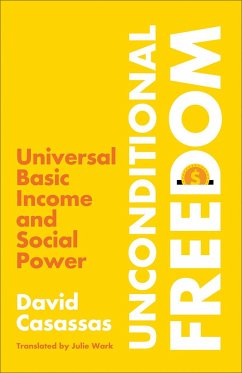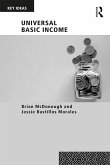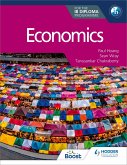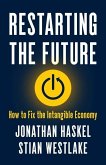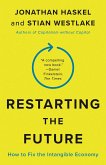17,99 €
inkl. MwSt.
Sofort lieferbar

9 °P sammeln
- Broschiertes Buch
- Merkliste
- Auf die Merkliste
- Bewerten Bewerten
- Teilen
- Produkt teilen
- Produkterinnerung
- Produkterinnerung
How Universal Basic Income could help liberate the working classes
Andere Kunden interessierten sich auch für
![Universal Basic Income Universal Basic Income]() Brian McDonoughUniversal Basic Income54,99 €
Brian McDonoughUniversal Basic Income54,99 €![Economics for the IB Diploma Economics for the IB Diploma]() Paul HoangEconomics for the IB Diploma49,99 €
Paul HoangEconomics for the IB Diploma49,99 €![Microeconomic Analysis Microeconomic Analysis]() Hal R. Varian (Berkeley University of California)Microeconomic Analysis69,29 €
Hal R. Varian (Berkeley University of California)Microeconomic Analysis69,29 €![Economics After the Crisis Economics After the Crisis]() Irene van StaverenEconomics After the Crisis121,99 €
Irene van StaverenEconomics After the Crisis121,99 €![Restarting the Future Restarting the Future]() Jonathan HaskelRestarting the Future31,99 €
Jonathan HaskelRestarting the Future31,99 €![Wellbeing Wellbeing]() Richard Layard (London School of Economics and Political Science)Wellbeing23,99 €
Richard Layard (London School of Economics and Political Science)Wellbeing23,99 €![Restarting the Future Restarting the Future]() Jonathan HaskelRestarting the Future17,99 €
Jonathan HaskelRestarting the Future17,99 €-
-
-
How Universal Basic Income could help liberate the working classes
Hinweis: Dieser Artikel kann nur an eine deutsche Lieferadresse ausgeliefert werden.
Hinweis: Dieser Artikel kann nur an eine deutsche Lieferadresse ausgeliefert werden.
Produktdetails
- Produktdetails
- Verlag: Pluto Press
- Seitenzahl: 272
- Erscheinungstermin: 20. Januar 2024
- Englisch
- Abmessung: 213mm x 139mm x 22mm
- Gewicht: 292g
- ISBN-13: 9780745348636
- ISBN-10: 0745348637
- Artikelnr.: 67734586
- Herstellerkennzeichnung
- Libri GmbH
- Europaallee 1
- 36244 Bad Hersfeld
- gpsr@libri.de
- Verlag: Pluto Press
- Seitenzahl: 272
- Erscheinungstermin: 20. Januar 2024
- Englisch
- Abmessung: 213mm x 139mm x 22mm
- Gewicht: 292g
- ISBN-13: 9780745348636
- ISBN-10: 0745348637
- Artikelnr.: 67734586
- Herstellerkennzeichnung
- Libri GmbH
- Europaallee 1
- 36244 Bad Hersfeld
- gpsr@libri.de
David Casassas is Associate Professor at the University of Barcelona, where he teaches social and political theory. He was the Secretary of the Basic Income Earth Network (BIEN) and he is now a member of its International Advisory Board. He has widely published on republicanism, socialism and basic income and is the author of the highly praised Spanish book The City in Flames: The validity of Adam Smith's commercial republicanism.
Acknowledgements
Introduction: Cap and Life
Part One: Cartographies Of Social (Dis)Order: Why Something Like a Basic
Income?
1. Psychosociology and Politics of Elitist Verticalism
2. The Fallacy of Autogenous Social Orders
3. The Liberal-Organicist Synthesis
4. Resisting Tutelage: Fraternity for the Civilising of a Conflictive World
Part Two: Holding the Gaze: Republicanism and Democracy
5. Socioeconomic Independence and Worlds in Common
6. Bargaining Power: Exit Options for Entry Doors and the Emancipatory
Potential of Basic Income
7. Universalisation of Citizenship and Universalisation of Property
8. Unconditional Freedom: Basic Income as Predistribution
Part Three: Flexible, Multi-Active Lives: The Dimensions of Social Power
9. Basic Income and Democratisation of Work
10. Why Do We Want Bargaining Power?
11. Our Flexibility Is Our Freedom
Part Four: The Dream Is Over: Post-Neoliberalism (or Why a Basic Income Now
And How)
12. "Wanting Everything Back": Basic Income in Contemporary Social
Movements
13. Societies of the Market or Societies with Markets?
14. Grappling with Customs in Common: A People's Political Economy?
15. Leaving the Proletariat and Becoming Free Workers
Epilogue: Unconditional Freedom at the Frontiers of Capitalism
Bibliography
Index
Introduction: Cap and Life
Part One: Cartographies Of Social (Dis)Order: Why Something Like a Basic
Income?
1. Psychosociology and Politics of Elitist Verticalism
2. The Fallacy of Autogenous Social Orders
3. The Liberal-Organicist Synthesis
4. Resisting Tutelage: Fraternity for the Civilising of a Conflictive World
Part Two: Holding the Gaze: Republicanism and Democracy
5. Socioeconomic Independence and Worlds in Common
6. Bargaining Power: Exit Options for Entry Doors and the Emancipatory
Potential of Basic Income
7. Universalisation of Citizenship and Universalisation of Property
8. Unconditional Freedom: Basic Income as Predistribution
Part Three: Flexible, Multi-Active Lives: The Dimensions of Social Power
9. Basic Income and Democratisation of Work
10. Why Do We Want Bargaining Power?
11. Our Flexibility Is Our Freedom
Part Four: The Dream Is Over: Post-Neoliberalism (or Why a Basic Income Now
And How)
12. "Wanting Everything Back": Basic Income in Contemporary Social
Movements
13. Societies of the Market or Societies with Markets?
14. Grappling with Customs in Common: A People's Political Economy?
15. Leaving the Proletariat and Becoming Free Workers
Epilogue: Unconditional Freedom at the Frontiers of Capitalism
Bibliography
Index
Acknowledgements
Introduction: Cap and Life
Part One: Cartographies Of Social (Dis)Order: Why Something Like a Basic
Income?
1. Psychosociology and Politics of Elitist Verticalism
2. The Fallacy of Autogenous Social Orders
3. The Liberal-Organicist Synthesis
4. Resisting Tutelage: Fraternity for the Civilising of a Conflictive World
Part Two: Holding the Gaze: Republicanism and Democracy
5. Socioeconomic Independence and Worlds in Common
6. Bargaining Power: Exit Options for Entry Doors and the Emancipatory
Potential of Basic Income
7. Universalisation of Citizenship and Universalisation of Property
8. Unconditional Freedom: Basic Income as Predistribution
Part Three: Flexible, Multi-Active Lives: The Dimensions of Social Power
9. Basic Income and Democratisation of Work
10. Why Do We Want Bargaining Power?
11. Our Flexibility Is Our Freedom
Part Four: The Dream Is Over: Post-Neoliberalism (or Why a Basic Income Now
And How)
12. "Wanting Everything Back": Basic Income in Contemporary Social
Movements
13. Societies of the Market or Societies with Markets?
14. Grappling with Customs in Common: A People's Political Economy?
15. Leaving the Proletariat and Becoming Free Workers
Epilogue: Unconditional Freedom at the Frontiers of Capitalism
Bibliography
Index
Introduction: Cap and Life
Part One: Cartographies Of Social (Dis)Order: Why Something Like a Basic
Income?
1. Psychosociology and Politics of Elitist Verticalism
2. The Fallacy of Autogenous Social Orders
3. The Liberal-Organicist Synthesis
4. Resisting Tutelage: Fraternity for the Civilising of a Conflictive World
Part Two: Holding the Gaze: Republicanism and Democracy
5. Socioeconomic Independence and Worlds in Common
6. Bargaining Power: Exit Options for Entry Doors and the Emancipatory
Potential of Basic Income
7. Universalisation of Citizenship and Universalisation of Property
8. Unconditional Freedom: Basic Income as Predistribution
Part Three: Flexible, Multi-Active Lives: The Dimensions of Social Power
9. Basic Income and Democratisation of Work
10. Why Do We Want Bargaining Power?
11. Our Flexibility Is Our Freedom
Part Four: The Dream Is Over: Post-Neoliberalism (or Why a Basic Income Now
And How)
12. "Wanting Everything Back": Basic Income in Contemporary Social
Movements
13. Societies of the Market or Societies with Markets?
14. Grappling with Customs in Common: A People's Political Economy?
15. Leaving the Proletariat and Becoming Free Workers
Epilogue: Unconditional Freedom at the Frontiers of Capitalism
Bibliography
Index
